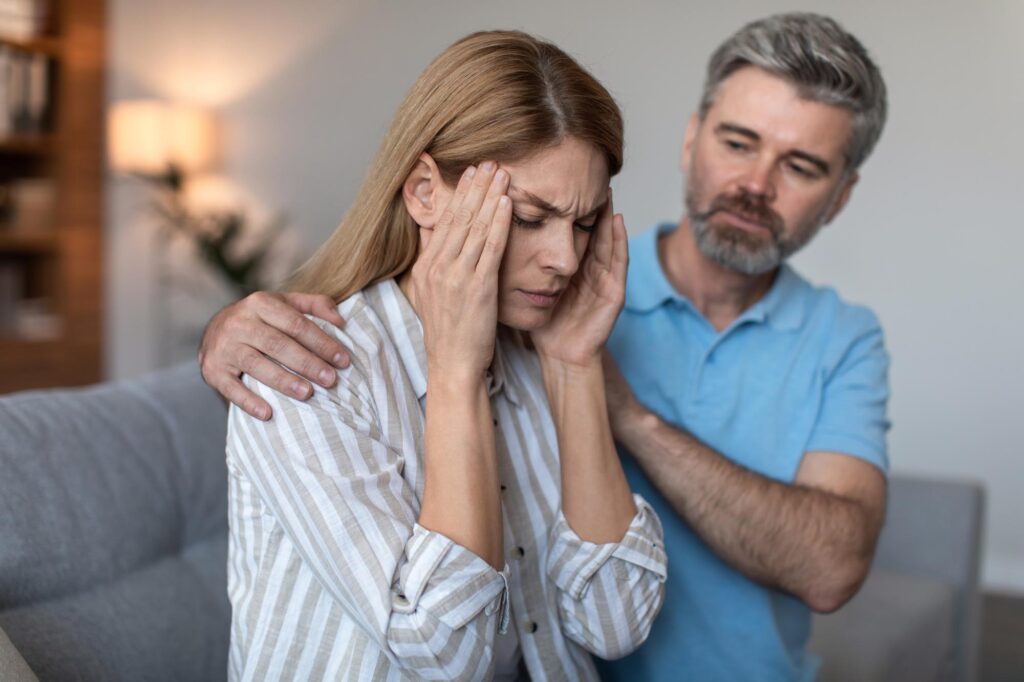Understanding Anxiety and Its Impact on Relationships

Living with anxiety is like carrying an invisible weight that affects every aspect of daily life. When one partner experiences anxiety, it creates ripples that touch both individuals in a relationship, shaping how they communicate, connect, and navigate life together.
What is Anxiety?
Anxiety manifests as an intense, persistent worry about future events or situations. While everyone experiences occasional anxiety, clinical anxiety disorders involve excessive fear responses that can significantly disrupt daily functioning. Common anxiety disorders include:
- Generalized Anxiety Disorder (GAD)
- Social Anxiety Disorder
- Panic Disorder
- Obsessive-Compulsive Disorder (OCD)
How Does Anxiety Affect the Body and Mind?
The impact of anxiety extends beyond emotional distress, triggering physical symptoms such as:
- Racing heart and shortness of breath
- Stomach discomfort and nausea
- Muscle tension and trembling
- Sleep disturbances
- Excessive sweating
Psychological symptoms often include:
- Intrusive thoughts about potential dangers
- Difficulty concentrating
- Constant worry about the future
- Fear of losing control
How Can Anxiety Impact Relationships?
These symptoms can lead to behavioral changes that affect relationships. A person with anxiety might:
- Avoid social situations or new experiences
- Seek constant reassurance from their partner
- Develop rigid routines or compulsive behaviors
- Withdraw from intimate moments
Understanding these patterns helps create a foundation for supporting a partner while maintaining a healthy relationship dynamic.
What are The Signs My Partner has Anxiety?
Recognizing anxiety in a partner requires attentiveness to both subtle and obvious behavioral changes. Here are key signs that might indicate your partner is experiencing anxiety:
Physical Signs:
- Restlessness or difficulty sitting still
- Rapid breathing or shortness of breath
- Excessive sweating
- Frequent complaints of fatigue
- Changes in eating patterns
- Sleep disturbances or insomnia
Behavioral Changes:
- Avoiding social situations or canceling plans last minute
- Seeking constant reassurance about decisions or relationships
- Difficulty concentrating or appearing distracted
- Procrastination on important tasks
- Increased irritability or emotional outbursts
- Withdrawal from intimate conversations or physical contact
Communication Patterns:
- Frequent expression of worry about future events
- Asking “what if” questions repeatedly
- Difficulty making decisions
- Expressing fear of judgment from others
- Apologizing excessively
- Struggling to express needs or feelings
These signs often manifest differently in each person, and your partner might display some but not all of these indicators. The intensity and frequency of these signs can vary based on stress levels, life changes, and other environmental factors.
What are Common Anxiety Disorders and Treatment Options?
Understanding your partner’s specific anxiety disorder empowers you to provide targeted support and encouragement. Different anxiety disorders present unique challenges and require specialized approaches:
- Generalized Anxiety Disorder (GAD): Persistent worry about multiple aspects of life
- Social Anxiety: Intense fear of social situations and judgment
- Panic Disorder: Recurring unexpected panic attacks
- Obsessive-Compulsive Disorder (OCD): Intrusive thoughts paired with compulsive behaviors
- Post-Traumatic Stress Disorder (PTSD): Anxiety stemming from past trauma
Evidence-based treatments have shown significant success in managing anxiety symptoms:
Cognitive Behavioral Therapy (CBT)
- Identifies and challenges anxious thought patterns
- Develops coping strategies
- Creates behavioral change through exposure therapy
Dialectical Behavior Therapy (DBT)
- Builds mindfulness skills
- Enhances emotional regulation
- Improves interpersonal effectiveness
At Arya Therapy Center, we tailor these therapeutic approaches to each individual’s needs. Our specialists combine CBT, DBT, and other modalities to create personalized treatment plans that address both immediate symptoms and long-term anxiety management.
Additional treatment options include:
- Medication management
- Mindfulness practices
- Group therapy
- Intensive Outpatient Programs (IOP)
How do I Communicate with an Anxious Partner?

Communication is crucial when supporting a partner with anxiety. It’s important to create a safe environment where your partner can openly discuss their fears and worries without being judged or dismissed.
Active Listening Techniques:
- Maintain eye contact and give your full attention
- Allow your partner to complete their thoughts without interruption
- Ask clarifying questions to show understanding
- Reflect back what you’ve heard to ensure accuracy
Validating Language Examples:
- “I hear how challenging this feels for you”
- “Your feelings make sense given what you’re experiencing”
- “I’m here to listen whenever you need me”
It’s essential to avoid minimizing statements like “just relax” or “don’t worry about it.” These phrases, though well-intentioned, can make your partner feel misunderstood or invalidated.
Creating Safe Conversations:
- Choose calm moments for important discussions
- Set aside dedicated time without distractions
- Use “I” statements to express your own feelings
- Acknowledge their progress and strengths
- Respect their pace in sharing information
Remember that anxiety can make communication itself feel overwhelming. Patience and consistency in your approach help build trust and create a foundation for honest dialogue. Your partner may need extra time to process thoughts or express feelings during conversations.
How Do I Support My Partner Without Enabling Anxiety
Supporting a partner with anxiety requires striking a delicate balance between being compassionate and avoiding patterns that reinforce anxious behaviors. Here’s how to navigate this challenge:
Supportive Behaviors:
- Listening without immediately jumping to solutions
- Acknowledging their feelings while encouraging healthy coping strategies
- Being present during challenging moments
- Celebrating small victories in managing anxiety
Signs of Enabling:
- Taking over tasks they fear
- Making excuses for avoidance behaviors
- Constantly providing reassurance
- Modifying your lifestyle to accommodate all anxiety triggers
The desire to protect your partner from distress is natural, but removing all anxiety-inducing situations can prevent them from developing crucial coping skills. Instead of rushing to “fix” their anxiety, allow them space to work through challenging moments with your steady support.
Creating Growth Opportunities:
- Start with small, manageable exposure to anxiety triggers
- Stay nearby as a source of comfort without taking control
- Validate their ability to handle difficult situations
- Maintain boundaries around your own needs and limitations
Remember that forcing confrontations with anxiety triggers can be counterproductive and potentially traumatic. The goal is to create a supportive environment where your partner feels safe exploring their own path to managing anxiety, while maintaining their independence and building resilience.
How Do I Encourage Professional Help and Treatment Engagement for My Partner’s Anxiety Disorder?
Suggesting professional help for anxiety requires sensitivity and thoughtful timing. Choose a calm moment when you’re both relaxed to share your observations and concerns with genuine care:
“I’ve noticed you seem to be carrying a heavy weight lately. I care about your wellbeing and wonder if speaking with someone might help lighten that load.“
Here are gentle ways to approach the conversation:
- Share positive experiences you’ve had with therapy
- Normalize seeking help as a sign of strength
- Express your commitment to supporting their journey
- Offer practical assistance in finding resources
When your partner shows interest in professional support, you can help by:
- Researching qualified providers who specialize in anxiety
- Assisting with insurance navigation
- Offering to accompany them to initial appointments
- Creating space for them to process their feelings about therapy
At Arya Therapy Center, we understand the complexities of anxiety and provide evidence-based treatments tailored to each individual’s needs. Our therapeutic approach combines proven modalities like CBT and DBT with personalized care strategies.
Remember that the decision to seek help must come from your partner. Your role is to provide loving support while respecting their autonomy in making healthcare choices. Some individuals need time to warm up to the idea of professional help – patience and consistent encouragement can make a significant difference.
What are Practical Techniques I Can Practice With My Partner to Manage Anxiety Symptoms?
Supporting your partner through anxiety involves active participation in coping strategies. Here are effective techniques you can practice together:
Grounding Exercises
- Guide your partner through the 5-4-3-2-1 method: naming 5 things they see, 4 they can touch, 3 they hear, 2 they smell, and 1 they taste
- Practice mindful walking together, focusing on each step and physical sensations
Breathing Techniques
- Try box breathing: inhale for 4 counts, hold for 4, exhale for 4, hold for 4
- Place one hand on your chest and one on your stomach, breathing deeply together
Physical Connection
- Offer gentle hand massage or shoulder rubs when your partner feels tense
- Create a calming physical presence without demanding conversation
Anxiety Check-Ins
- Develop a simple rating system (1-10) to communicate anxiety levels
- Create code words for different types of support needed
Mindfulness Activities
- Share quiet moments of meditation using guided apps
- Practice progressive muscle relaxation exercises together
Environmental Adjustments
- Create a designated calm space in your home
- Identify and reduce common anxiety triggers in shared spaces
Remember to ask your partner which techniques feel most helpful and adjust your approach based on their feedback. These practices work best when incorporated regularly, not just during heightened anxiety moments.
Maintaining Patience and Celebrating Progress Over Time in Your Relationship with an Anxious Partner
Recovery from anxiety isn’t a straight path – it’s full of ups, downs, and unexpected twists. Your partner might make significant progress one week, then experience heightened symptoms the next. This natural ebb and flow requires patience, understanding, and a shift in how we measure success.
Creating a Progress-Focused Mindset:
- Celebrate small victories – getting through a challenging social event or making a difficult phone call
- Document improvements in a shared journal to track growth over time
- Focus on effort and courage rather than perfect outcomes
- Acknowledge that setbacks are natural stepping stones, not failures
Building Resilience Together:
- Create a “wins jar” where you both write down positive moments and read them during tough times
- Take photos or keep mementos of anxiety-challenging experiences you’ve conquered together
- Share appreciation for each other’s strength and commitment to growth
Remember that healing happens in subtle ways – your partner might handle a previously triggering situation with less distress, or develop new coping strategies. These quiet victories deserve recognition and celebration.
Your steady presence during both progress and setbacks creates a foundation of trust and safety. This stability allows your partner to face anxiety challenges knowing they have unconditional support in their corner.
Self-Care Strategies for Partners of Anxious Individuals
Supporting a partner with anxiety requires significant emotional energy and dedication. Your well-being matters just as much as your partner’s – think of it like securing your own oxygen mask before helping others.
Essential Self-Care Practices:
- Schedule regular “me time” for activities that recharge you
- Maintain your own social connections and support network
- Set healthy boundaries to protect your emotional reserves
- Practice stress-management techniques like meditation or exercise
- Keep up with your own medical and mental health check-ups
Remember: feeling overwhelmed or frustrated at times doesn’t make you a bad partner – it makes you human.
Getting Your Partner Help with Arya Therapy Center
While your support is invaluable, professional guidance creates a foundation for lasting positive change. At Arya Therapy Center, we understand the unique challenges faced by couples navigating anxiety together. Our evidence-based approach combines:
- Individual therapy tailored to your partner’s specific anxiety presentation, which can include various anxiety disorders
- Couples counseling to strengthen communication and mutual understanding
- Intensive outpatient programs for comprehensive care, part of our wide range of programs
- Integration of proven modalities like CBT, DBT, and EMDR
Your Next Step Forward
Located in Newton, MA, Arya Therapy Center offers personalized mental health care in a discreet, supportive environment. Our specialized team works with high-achieving adults and professionals in the Greater Boston area, providing the tools and support needed for both partners to thrive.
Ready to explore how professional support can enhance your journey together? Contact Arya Therapy Center to learn about our personalized therapy options. We’re here to help you and your partner build a stronger, more resilient relationship while effectively managing anxiety.
Your commitment to supporting your partner is admirable – let us help you both navigate this path with confidence and care.
FAQs (Frequently Asked Questions)
What are common signs that my partner may be struggling with anxiety?
Common signs of anxiety in a partner include withdrawal from social interactions, irritability, anxious thought patterns, physical symptoms like stomach pain or shakiness, and behaviors such as avoidance or compulsive actions.
What types of anxiety disorders should I be aware of in my relationship?
It’s important to understand your partner’s specific type of anxiety disorder. Common types include generalized anxiety disorder, panic disorder, social anxiety, and obsessive-compulsive disorder. Learning about these can help in providing appropriate support and encouraging effective treatment.
How can I communicate effectively with my partner who has anxiety?
Effective communication involves encouraging honest conversations without judgment or stigma. Using empathetic language to validate your partner’s feelings rather than dismissing them fosters trust and openness.
How do I support my anxious partner without enabling their anxiety?
Supporting your partner means balancing compassion with encouragement to face challenges. Avoid enabling avoidance or compulsive behaviors by not forcing confrontation or trying to ‘fix’ the problem, as this can sometimes be harmful.
What treatment options are available for anxiety disorders?
Evidence-based treatments include Cognitive Behavioral Therapy (CBT) and Dialectical Behavior Therapy (DBT). Centers like Arya Therapy Center offer individualized therapy options tailored to your partner’s needs, emphasizing professional guidance alongside compassionate partnership.
What practical techniques can we practice together to manage anxiety symptoms?
Partners can engage in techniques such as mindfulness exercises, deep breathing, and grounding strategies to reduce acute anxiety symptoms. Practicing these together strengthens your connection and provides mutual support during challenging times.
